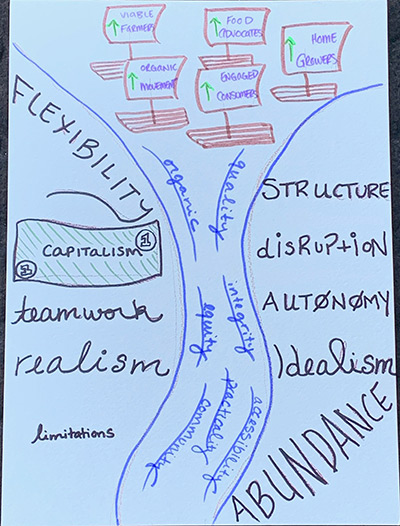Lee Warren, Executive Director, Organic Growers School
Organic Growers School (OGS) came into 2019 with some big questions. Our goal was to engage in a strategic planning process, not with the intention to reinvent our mission, vision, or values, but to figure out the next steps in the evolution of the organization. We had many inquiries but not many answers.
- Big Question #1: What has been our impact in the world?
- Big Question #2: In this rapidly changing media landscape, where do we fit?
- Big Question #3: What is our commitment to social justice?
- Big Question #4: What is our approach to the competition and saturation in our region?
- Big Question #5: What is our policy on advocacy?
- Big Question #6: Without a development director, what is our fundraising capacity?
- Big Question #7: Are we able to engage with consumers in addition to growers?
- Big Question #8: Can we better support staff with benefits, especially health insurance?
- Big questions #9: How do we have a healthy and engaged board?
- Big Question #10: In order to be who we want to be, do we shrink, grow, or stay the same?
By mid-summer of 2019, we had hired a strategic planning consultant and had begun to delve into the nuances and challenges required for a process of deep inquiry. By December of 2019, we were ready to tackle the social justice question, which has been no small issue for OGS.
OGS is a mostly white organization and has been since its inception in 1993. Over the last five years, many of us on staff and board have been waking up to our privilege as white farmers and growers that rests on a long history of exploitation, racism, and inequality in agriculture. Because of this awareness, we realized that we can’t reach our goal of transforming the food system towards a sustainable model without dismantling the injustice and oppressive practices that guide it.
But dismantling a very entrenched system through actual ACTION is entirely different than awareness. Our action started with education of staff and board through the Racial Equity Institute, Building Bridges, and other equity training programs, thankfully offered in our area. This opened our eyes to how many mistakes we’ve been making along the way and how much we’ve gotten wrong.
First and foremost, we have avoided the topic, thereby avoiding the discomfort, anxiety, and shame about our own privilege which has led to entrenched views, overt and covert racist attitudes, and extreme difficulty in approaching the discussion. We have also consistently alienated folks of color from our organization and its programs due to our willful ignorance, dismissive attitudes, and downright errors of judgement through the years. During our early attempts to rectify these dynamics, we plowed ahead with what we erroneously thought was the right direction: bringing on teachers, board members, and staff members of color. Yet through our lack of social justice infrastructure and context, less than inclusive policies, and limited understanding, we stepped on more toes, hurt more feelings, and made more mistakes.
One of our biggest areas of learning has been that we will continue to make mistakes. We will continue to stumble and get it wrong and part of the approach is to get comfortable with imperfection. Our commitment to evolving our understanding, incorporating inclusion, and practicing equity has become a central priority in our work. Our social justice statement, created in 2017, states that “We must take bold action steps towards upholding our values of diversity, inclusion and equity within the food system.”
On an operations level, that commitment has become an increasing challenge. In a phrase, it’s expensive. It takes extra time, money, and energy on every level. All of our policies need to be rethought, venue choices questioned, accessibility systems ascertained, and food, exhibitors, instructors, and billing practices assessed through the lens of social justice. How does a small nonprofit organization build the leadership and capacity for this work without sinking the ship? While there’s no turning back on our social justice agenda, does our passion and engagement with this topic take us off course with our mission? Are we a social justice organization doing agriculture or an agriculture organization doing social justice?
 These were the essential questions that engaged us during our December 2019 retreat. Throughout the sometimes heated conversation, its seems that we finally had some of the push and pull that allowed us a breakthrough with regards to these topics.
These were the essential questions that engaged us during our December 2019 retreat. Throughout the sometimes heated conversation, its seems that we finally had some of the push and pull that allowed us a breakthrough with regards to these topics.
The image that came to us was crafted in a truly collaborative style. The river itself represents our deeply held values of quality, organic, integrity, equity, accessibility, practicality, and community. The boats on the river represent our goals to increase the farmers, home-growers, and consumers who are engaging with organic growing and sustainability in their lives. And the banks of the river represent the polarities of our work which will always be with us in varying forms. They include flexibility and structure; teamwork and autonomy; limitations and abundance; realism and idealism; systems of oppression and liberation; capitalism and disruption. Having a sense that these elements all come into play is helpful in remembering that this is a dance, a journey, and a process.
Some of the other positives that emerged:
- We now know more about what we don’t know.
- We are working to get our entire team educated.
- We can finally have honest conversations about inequity, injustice, and our many mistakes and in the process we have been able to hear each other.
- We’ve been successfully raising money for equity initiatives that weren’t in our budget.
- We have cooperatively created an image that can help us navigate the complexities of undertaking social justice work as a strategic priority.
- We discovered that equity is part of the river we are flowing in and not a polarity in our work.
Through this process it seems as though we are more fully able to hold both the complexity and the paradox of the task before us: To actively advocate for an organic food system that values resilience, equity, and community. While no one is saying it will be easy, we are at least on the same river together, moving in the same direction.
 Lee Warren, BS, has been the executive director of Organic Growers School, a 501(c)(3) nonprofit based in Asheville, since 2013. She is a sustainability professional with twenty-five years of experience envisioning, designing, and living innovative solutions to organic food systems, community, and sustainability education.
Lee Warren, BS, has been the executive director of Organic Growers School, a 501(c)(3) nonprofit based in Asheville, since 2013. She is a sustainability professional with twenty-five years of experience envisioning, designing, and living innovative solutions to organic food systems, community, and sustainability education.
Organic Growers School has been supporting, educating, and inspiring organic growers in the Southern Appalachian region since 1993. For nearly 27 years, the organization has taken a solid stand for sustainable agriculture in the form of small-scale and regional food production, as a solution to the environmental, economic, and health crises of our time, and as abject alternative to industrial and global food practices. OGS serves adult growers of all scales, sizes, and production systems primarily in the 23 counties in western NC.
Organic Growers School has been a Center Member since 2005.